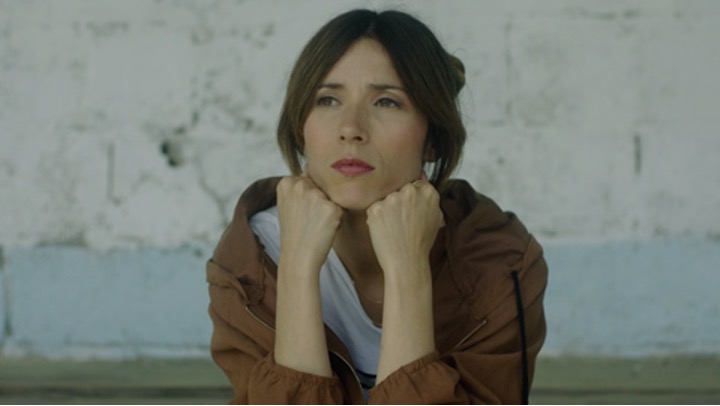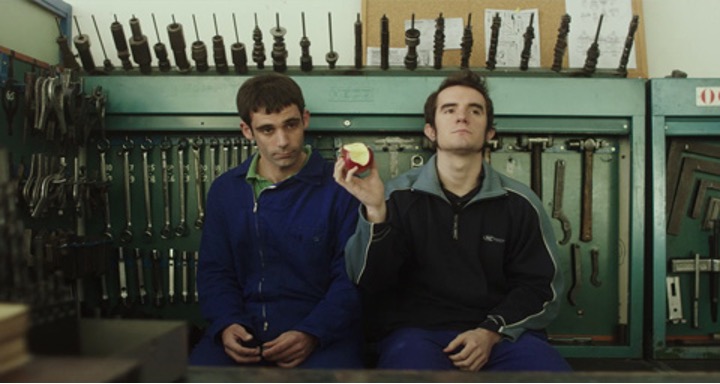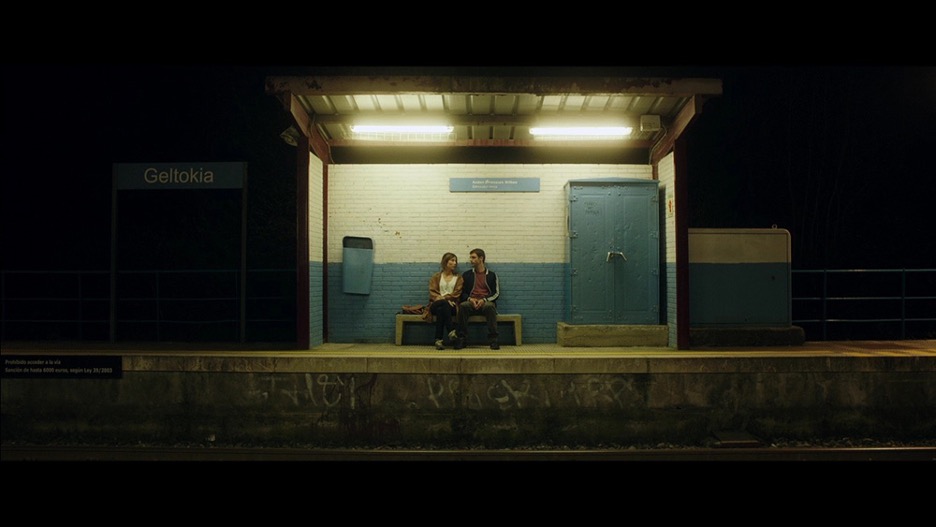By Katerina Taxiaropoulou,
Ben Sharrock’s innovative debut film opens with a definition of its peculiar title. In Basque, the word pikadero bears two meanings: 1) a riding school and 2) a public space used for sexual encounters. With an acerbic, deadpan humour, Pikadero makes reference to the second one.
The two main characters, young Gorka (Joseba Usabiaga) and Ane (Barbara Goenaga) desperately try to find a place where they can let go and consummate whatever relationship it is that they’re having. As they are both living with their parents and have little or no money of their own, however, their options are limited. First, they try the toilet at a café, then a remote parking space and Gorka’s house. At some point, they even visit a strange man’s trailer, which he illegally rents to lovers by the hour.
The comedy arises as the characters’ attempts to have some intimate moments keep getting frustrated in the most absurd ways, like when a man walks in the café’s toilet and wears Anne’s hanging shirt, or when Gorka’s grandfather sits on one end of the sofa to eat his food and watch sports, while the couple is kissing on the other end. Gorka’s house especially, which is occupied by all three generations of the family provides a brilliant setting for humour, visual, acoustic as well as verbal. In one scene, grandfather, father and son sit crammed on the sofa watching rugby, without uttering any word. At the same time, the mother goes on and on about the neighbors’ whereabouts while she is folding laundry in the back.
Yet, despite the comedic effect of this picture, the audience appears somewhat reserved in its reaction. Its laughter is not explosive but weak, and it soon dies off. That is because, as a reviewer puts it, in this and many other funny scenes of the film, there is “a sense of quiet tragedy” (Letterboxd).
The characters repeatedly fail in their attempt to experience passion, not only in sex, but also in life. Ane has studied History of Art while, like she says, she cannot paint and enjoys not much of art apart from realism. On top of that, because of the financial crisis, she cannot find a job with her degree. In the film’s present, she is learning English so as to become a translator, but again, she is not very successful at it. The only teacher she could find in her town is one who barely knows English himself. Finally, she shares that she dreams of working as a teacher in a place like Edinburgh, a postcard of which she saw at the market and instantly fell in love with its beauty.

What makes her character tragic is that although she is actively trying to better her life, the environment around her suppresses her every move. According to reviewer Amber Wilkinson, Ane portrays the economic crisis’s “adverse impact on the young” (Eye For Film). Yes, she is unstable in her desires, and yes, her decisions appear to be made on a whim rather than careful thought. She is, however, in her twenties and needs to experiment with different fields of study and occupation until she finds what is truly for her. Dealing with a collapsing economy, Basque Country gives her no options.
Despite the discouraging circumstances, Ane has not lost the ability to dream. She is strongly motivated to pursue a different life. She tries, she fails and then tries again. She keeps moving, as she is not afraid of change. The audience therefore is hopeful about her.
On the other hand, Gorka’s character does not inspire the same feeling. Like Ane he is stuck living with his parents and doing an unfulfilling job that pays him nothing. Unlike Ane, he has no motivation to change his situation. Instead, he looks at life from a distance, emotionless and still, as if he does not care. In an interview, the director explains his behaviour: “I think Gorka’s character is about being slightly lost in life. I think that people react in different ways to being lost and Gorka has detached himself from different aspects of his life” (cineuropa).

At home, Gorka is absent. He does not react to his parents’ oppressive and sometimes offensive opinions about him and his life. Further, he does not claim his right for privacy and respect, but lets his mother intrude his personal space and treat him like a child. In the key-making factory where he works as an apprentice, he also seems dislocated, as he shows no passion nor simple interest about what he is doing. He simply comes and goes, following the same routine as his father did. When Ane asks him whether he is happy with his work, he characteristically replies: “it’s just a job”.
His detached attitude towards life starts changing when he falls in love with Ane. She, her wish to do a job she is passionate about and her dream to go abroad, awake in him a desire to pursue a better future for himself. He realizes that his family home, his job, his town, even his country is dead-end. So, he expresses his frustration against his intruding mother. He does things outside his mechanic routine, like when he buys Ane a book about Edinburgh and wraps it himself with a pretty paper. He even starts learning English to go to Scotland with her. His relationship with Ane therefore concerns far more than sex. In her he finds inspiration and encouragement. He finds the motivation he had been missing.
Unfortunately, fear soon kicks in and holds Gorka back. Although he is tempted, he is too scared to risk everything he has known and lets Ane go. He is not ready to leave. As much inspiring her dream is, he needs to find a dream of his own first. According to the director, this film is about “trying to figure out life and what you want from it. It is a little existential.” (cineuropa).
The audience is frustrated with Gorka, but at the same time sympathetic. Everyone has felt lack of direction and purpose in their life, especially in youth. Pikadero asks the terrifying question: what if one has no dream? Where is the point then? Thus, humour arrives in the way that modern tragicomedy suggests that “laughter is the only response left to man when he is faced with the tragic emptiness and meaninglessness of existence” (Britannica).
Despite this, the film does not leave the audience with a sense of despair or, worse, helplessness. Through static shots and less emotional acting, Pikadero manages to distance the viewer from Gorka and his decisions. Thus, he or she is able to look at the character from a critical point of view and say: I understand his struggle, I’ve been there/ I am there myself, but this is not what I want my life to look like.
References
- Pikadero. eyeforfilm.co.uk. Available here
-
Location, Dislocation and Sexual Frustration. eyeforfilm.co.uk. Available here
- Pikadero. letterboxd.com. Available here
- Pikadero. cineuropa.org. Available here
- Tragicomedy. britannica.com. Available here




